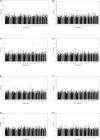Pharmacogenomics of hypertension: a genome‐wide, placebo‐controlled cross‐over study, using four classes of antihypertensive drugs
- PMID: 25622599
- PMCID: PMC4330076
- DOI: 10.1161/JAHA.115.001778
Pharmacogenomics of hypertension: a genome‐wide, placebo‐controlled cross‐over study, using four classes of antihypertensive drugs
Abstract
Background: Identification of genetic markers of antihypertensive drug responses could assist in individualization of hypertension treatment.
Methods and results: We conducted a genome-wide association study to identify gene loci influencing the responsiveness of 228 male patients to 4 classes of antihypertensive drugs. The Genetics of Drug Responsiveness in Essential Hypertension (GENRES) study is a double-blind, placebo-controlled cross-over study where each subject received amlodipine, bisoprolol,hydrochlorothiazide, and losartan, each as a monotherapy, in a randomized order. Replication analyses were performed in 4 studies with patients of European ancestry (PEAR Study, N=386; GERA I and II Studies, N=196 and N=198; SOPHIA Study, N=372). We identified 3 single-nucleotide polymorphisms within the ACY3 gene that showed associations with bisoprolol response reaching genome-wide significance (P<5x10(-8))however, this could not be replicated in the PEAR Study using atenolol. In addition, 39 single-nucleotide polymorphisms showed P values of 10(-5) to 10(-7). The 20 top-associated single-nucleotide polymorphisms were different for each antihypertensive drug. None of these top single-nucleotide polymorphisms co-localized with the panel of >40 genes identified in genome-wide association studies of hypertension. Replication analyses of GENRES results provided suggestive evidence for a missense variant (rs3814995) in the NPHS1 (nephrin) gene influencing losartan response, and for 2 variants influencing hydrochlorothiazide response, located within or close to the ALDH1A3 (rs3825926) and CLIC5 (rs321329) genes.
Conclusions: These data provide some evidence for a link between biology of the glomerular protein nephrin and antihypertensive action of angiotensin receptor antagonists and encourage additional studies on aldehyde dehydrogenase–mediated reactions in antihypertensive drug action.
Figures


Similar articles
-
Pharmacogenomics of amlodipine and hydrochlorothiazide therapy and the quest for improved control of hypertension: a mini review.Heart Fail Rev. 2019 May;24(3):343-357. doi: 10.1007/s10741-018-09765-y. Heart Fail Rev. 2019. PMID: 30645721 Free PMC article. Review.
-
Predictors of antihypertensive drug responses: initial data from a placebo-controlled, randomized, cross-over study with four antihypertensive drugs (The GENRES Study).Am J Hypertens. 2007 Mar;20(3):311-8. doi: 10.1016/j.amjhyper.2006.09.006. Am J Hypertens. 2007. PMID: 17324745 Clinical Trial.
-
Laboratory tests as predictors of the antihypertensive effects of amlodipine, bisoprolol, hydrochlorothiazide and losartan in men: results from the randomized, double-blind, crossover GENRES Study.J Hypertens. 2008 Jun;26(6):1250-6. doi: 10.1097/HJH.0b013e3282fcc37f. J Hypertens. 2008. PMID: 18475165 Clinical Trial.
-
Pharmacoepigenetics of hypertension: genome-wide methylation analysis of responsiveness to four classes of antihypertensive drugs using a double-blind crossover study design.Epigenetics. 2022 Nov;17(11):1432-1445. doi: 10.1080/15592294.2022.2038418. Epub 2022 Feb 25. Epigenetics. 2022. PMID: 35213289 Free PMC article. Clinical Trial.
-
Clinical and molecular approaches to individualize antihypertensive drug therapy.Ann Med. 2012 Jun;44 Suppl 1:S23-9. doi: 10.3109/07853890.2012.679960. Ann Med. 2012. PMID: 22713145 Review.
Cited by
-
Pharmacogenomics of amlodipine and hydrochlorothiazide therapy and the quest for improved control of hypertension: a mini review.Heart Fail Rev. 2019 May;24(3):343-357. doi: 10.1007/s10741-018-09765-y. Heart Fail Rev. 2019. PMID: 30645721 Free PMC article. Review.
-
CYP2D6 and ADRB1 genetic polymorphisms and the selection of antihypertensive beta-receptor blockers for hypertensive patients.Am J Cardiovasc Dis. 2023 Aug 15;13(4):264-271. eCollection 2023. Am J Cardiovasc Dis. 2023. PMID: 37736348 Free PMC article.
-
Personalized medicine and treatment approaches in hypertension: current perspectives.Integr Blood Press Control. 2016 Apr 6;9:59-67. doi: 10.2147/IBPC.S74320. eCollection 2016. Integr Blood Press Control. 2016. PMID: 27103841 Free PMC article. Review.
-
Genome-Wide Meta-Analysis of Blood Pressure Response to β1-Blockers: Results From ICAPS (International Consortium of Antihypertensive Pharmacogenomics Studies).J Am Heart Assoc. 2019 Aug 20;8(16):e013115. doi: 10.1161/JAHA.119.013115. Epub 2019 Aug 19. J Am Heart Assoc. 2019. PMID: 31423876 Free PMC article.
-
Hypertension genomics and cardiovascular prevention.Ann Transl Med. 2018 Aug;6(15):291. doi: 10.21037/atm.2018.06.34. Ann Transl Med. 2018. PMID: 30211179 Free PMC article. Review.
References
-
- Murray CJ, Lopez AD. Measuring the global burden of disease. N Engl J Med. 2013; 369:448-457. - PubMed
-
- Egan BM, Zhao Y, Axon RN. US trends in prevalence, awareness, treatment, and control of hypertension, 1988‐2008. JAMA. 2010; 303:2043-2050. - PubMed
-
- Banegas JR, López‐García E, Dallongeville J, Guallar E, Halcox JP, Borghi C, Massó‐González EL, Jiménez FJ, Perk J, Steg PG, De Backer G, Rodríguez‐Artalejo F. Achievement of treatment goals for primary prevention of cardiovascular disease in clinical practice across Europe: the EURIKA study. Eur Heart J. 2011; 32:2143-2152. - PMC - PubMed
-
- Padmanabhan S, Newton‐Cheh C, Dominiczak A. Genetic basis of blood pressure and hypertension. Trends Genet. 2012; 28:397-408. - PubMed
Publication types
MeSH terms
Substances
Grants and funding
LinkOut - more resources
Full Text Sources
Medical
Molecular Biology Databases

